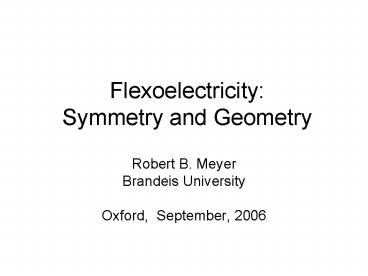Flexoelectricity: Symmetry and Geometry - PowerPoint PPT Presentation
1 / 35
Title:
Flexoelectricity: Symmetry and Geometry
Description:
Example: structure and energy of blue phases of cholesterics, which depend on ... Jay Patel discovered the effect experi-mentally, and concluded it must be ... – PowerPoint PPT presentation
Number of Views:254
Avg rating:3.0/5.0
Title: Flexoelectricity: Symmetry and Geometry
1
FlexoelectricitySymmetry and Geometry
- Robert B. Meyer
- Brandeis University
- Oxford, September, 2006
2
F. C. Frank
3
Origins
- Discuss. Faraday Soc. vol.25, p.19 (1958) F.C.
Frank pointed out the intrinsic coupling between
polar symmetry (parallel to the director) and
splay, noting that since nematics do not exhibit
spontaneous splay, they are also not
spontaneously polar. Analogous to the coupling
of molecular chirality to spontaneous twist. - PRL, vol.22, p.918 (1969) Meyer generalizes
Franks argument to induced polar order electric
field orients molecular dipoles, and thereby
induces splay or, vice versa, splay induces polar
molecular ordering and, through molecular
dipoles, electrical polarization. Also points
out the coupling of bend and polar order
perpendicular to the director.
4
Basic Symmetry
5
Free Energy
6
Sign convention
7
(No Transcript)
8
Surface Effect
- Flexoelectric terms do not appear in the Euler
Lagrange equations. - Volume integral of flexoelectric terms in the
free energy can be converted to a surface
integral.
9
Meaning of surface effectOrientation of the
director at boundaries determines the energy
10
Elastic energy controls structure within the
fixed boundaries
11
Some comparisons
- The spontaneous twist term does not show up in
the Euler Lagrange equation for chiral nematics. - In the analogous 1D problem for a chiral nematic,
the spontaneous twist term in the free energy
depends only on the boundary values.
12
Some Warnings!
- In problems with variable boundary conditions,
including the appearance, disappearance or
movement of defects, be wary of throwing away
surface terms. - Example structure and energy of blue phases of
cholesterics, which depend on arrays of defects
for their stability.
13
Only one flexoelectric coefficient
- Corollary of the surface effect point of view,
for certain problems. - More a mathematical than a physical statement.
- For intuitive understanding of effects, the
simple splay and bend pictures are most helpful.
14
Molecular models
15
(No Transcript)
16
Molecular models
- J. Prost and J.P. Marcerou, Journal de Physique
vol.38, p.315 (1977).
17
Polarization of a circular sample
18
Same argument for quadrupolar molecules
19
Cholesteric flexoelectro-optic effect
- Patel and Meyer, PRL vol.58, p.1538 (1987).
- Jay Patel discovered the effect experi-mentally,
and concluded it must be related to
flexoelectricity since the measured rotation of
the optical axis was linear in electric field
(sign and magnitude). Meyer unraveled the
geometry.
20
- The work of Bouligand was crucial to
understanding the geometry. It connected the
arches pattern of Meyers first paper to
oblique sections of the chosteric helical
structure seem in electron micrographs of crab
cuticle and other biological structures. (J. de
Physique, colloq. 30, C4-90 (1969). - A note to grad students read widely in your
field. Completely unrelated pieces of knowledge
may come together in an important way!
21
(No Transcript)
22
(No Transcript)
23
(No Transcript)
24
Modern times!
- Bimesogens are shown to have very large
flexoelectric coefficients. - Coles group JAP vol.99 p.034104 (2006).
- Zenithally bistable nematic devices various
conference references, and U.S. Patent No.
6,249,332, (June 19, 2001) by ZBD inventors. - Development of the chiral nematic
flexoelectro-optical device, including polymer
stabilization. - Molecular and device modeling.
25
Bimesogens splay
26
Bimesogens bend
27
Bimesogens large effect
- Argument based on long range dipole dipole
correlation functions created by the molecular
pairing ???
28
Flexoelectro-optic effect
- Using bimesogens, the combination of positive
splay and bend flexoelectric coefficients is most
favorable.
29
ZBND modeling switching
- L.A Parry-Jones and S.J. Elston, JAP vol. 97,
p.093515 (2005). - A.J. Davidson and N.J. Mottram, PRE vol.65
p.051710 (2002). - This conference
- A qualitative sketch for the case of equal
positive splay and bend flexoelectric
coefficients.
30
ZBND Top electrode -
31
Relaxation to defect state
32
ZBND Top electrode
33
Relaxation to vertical state
34
Switching defective to vertical state
35
Switching vertical to defective state































